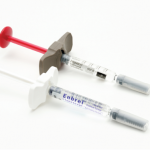This study affirms that dysbiosis is a feature of rheumatoid arthritis (RA) and suggests that specific therapies may differentially modulate the gastrointestinal microbiota in RA.

Therapeutic Drug Monitoring May Offer Little Benefit to Patient Remission Rates During Infliximab Induction Therapy
Although rheumatologists prescribe tumor necrosis factor inhibitors (TNFi’s) to treat several rheumatic diseases, they recognize immunogenicity influences the efficacy and safety of TNFi’s. Example: The formation of anti-drug antibodies can affect infusion reactions and cause low-serum drug levels and therapeutic failure. The induction phase is a period of high incidence of immunogenicity, and observational data…
For Psoriasis, Ustekinumab & TNF Inhibitors Show Similar Cardiac Safety
NEW YORK (Reuters Health)—In patients with psoriasis and psoriatic arthritis, the incidence of atrial fibrillation and major adverse cardiovascular events does not differ between treatment with ustekinumab and TNF inhibitors, according to a large observational study. “Given a high cardiovascular risk among patients with psoriasis and psoriatic arthritis,” Seoyoung C. Kim, MD, ScD, MSCE, told…
Ixekizumab Improves Outcomes of Ankylosing Spondylitis
NEW YORK (Reuters Health)—Ixekizumab improves signs and symptoms in patients with radiographic axial spondyloarthritis (ankylosing spondylitis), according to results from the COAST-W study. “Ankylosing spondylitis is a chronic and debilitating disease, and I have a large number of patients who have failed TNF inhibitors,” says Dr. Atul Deodhar from Oregon Health and Science University, Portland….

TNF Inhibitor Drug Tapering Successful in Some Patients with RA
MADRID—Scores on the Health Assessment Questionnaire for Rheumatoid Arthritis (HAQ) and C-reactive protein (CRP) levels were independent predictors of whether patients could be tapered successfully from a TNF inhibitor after having reached remission of their RA, according to findings presented in a session at the Annual European Congress of Rheumatology. Researchers also developed a composite…
Ixekizumab Eases Psoriatic Arthritis when TNF Inhibitor Fails
NEW YORK (Reuters Health)—The selective interleukin-17A inhibitor ixekizumab improved signs and symptoms of active psoriatic arthritis (PsA) in patients who had failed prior biologic therapy in the phase 3 SPIRIT-P2 trial. The SPIRIT-P2 trial joins the earlier phase 3 SPIRIT-P1 trial, which showed that ixekizumab was safe and effective in PsA patients not previously treated…
Transfer of Certolizumab in Breast Milk Not a Concern
NEW YORK (Reuters Health)—There is minimal to no transfer of the tumor necrosis factor (TNF) inhibitor certolizumab (Cimzia) from plasma to breast milk, according to a new study. “These findings are reassuring” and imply that continuing certolizumab treatment is compatible with breastfeeding, Dr. Megan Clowse of Duke University School of Medicine in Durham, North Carolina,…
TNF Inhibitor Tied to Lower Cardiovascular Risk in Psoriasis
NEW YORK (Reuters Health)—Psoriasis patients treated with tumor necrosis factor-alpha (TNF) inhibitors may have a lower risk of major cardiovascular (CV) events than those treated with methotrexate (MTX), according to a new study. “The findings do not surprise me. TNF inhibitors control inflammation better than methotrexate,” lead author Dr. Jashin J. Wu of Kaiser Permanente…

As Role of Kinase Inhibitors in Rheumatic Disease Treatment Expands, Experts Review Therapy’s Failures, Successes
LONDON—Kinase inhibitors’ profile in the world of rheumatic disease therapy is growing, and they are probably going to play an even larger and more central role as time goes on, experts said at the Annual Congress of the European League Against Rheumatism (EULAR) 2016. But Gary S. Firestein, MD, director of the Clinical and Translational…